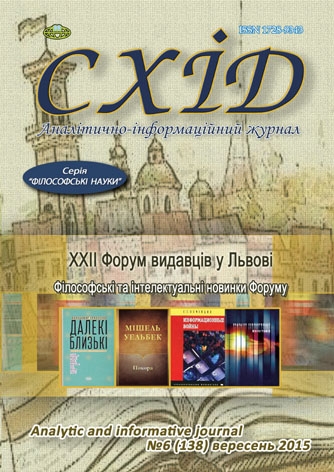Methodological foundations for contemporary Religious Studies of Adventism
DOI:
https://doi.org/10.21847/1728-9343.2015.6(138).54648Keywords:
Adventism, modern, postmodern, late modern Christianity, narrative, postliberalism, postconservatismAbstract
The article deals with the topic of contemporary criticism of methodological foundations for contemporary Religious Studies of Adventism. The analysis of theoretical and methodological works of Ukrainian and foreign scientists of Religious Studies and theologians allowed to select features of postmodern and late modern types of Protestantism in general and Adventism in particular. For the world Adventism is characterized internal struggle between late modern and postmodern types of Christianity. In particular, there is postmodern on their type and form of expression is the argument in favor of female priesthood, greater openness to the world. In Ukraine, even in the missionary and social work which is objectively the most open to the world, not seeing a transition to a postmodern type of Christianity, although some elements of postmodern practices find their application. But these elements are used only in so far as they are useful and do not violate the general style of Adventism, not threaten the integrity of faith and lifestyles of Adventists do not contradict moral values and practical principles of the social doctrine of Adventism. This allows us to hypothesize that a series of practices common to late modern Christianity and postmodern types of activity of Christians in the postmodern environment. Such practices can be called an open feature of Christianity, which, in active cooperation with the world refuses to lose its own identity. But as organic practices develop appropriate methods of church life and activity of believers formed in late modern period, we attribute it to their typological characteristics of contemporary Adventism as a form of late modern Christianity. With all the openness to the contemporary world and the transformation Adventism is developed as late modern Christianity, which is reflected in practical life of Ukrainian Adventism.
Downloads
References
Adventists called for to study the question of the ordination of women alone, available at: http://adventist.ru/2014/10/01/adventistov-prizvali-izuchat-vopros-o-rukopolozhenii-zhenshhin-samostoyatelno (rus).
Baumeister А. (2014), Being and good, T.P.Baranovska Publ., Vinnytsia, 418 p. (ukr).
Bruggeman W. (2012), Prophetic Imagination, Colloquium, Cherkasy, 231 p. (rus).
Buchma О. (2005), Fundamentalism and liberalism in contemporary Christianity, in Kolodnyi A. (ed.), Christianity in the postmodern era, Kyiv, p. 69-86 (ukr).
Weiss D. E. (2002), Postmodern Times: A Christian perspective on contemporary thought and culture, Lutheran Heritage Foundation,Moscow, 240 p. (rus).
Volokh V. O. (2012), Writing and narrative. The principles of narrative analysis of Paul’s epistles, Colloquium, Cherkasy, 130 p. (rus).
Heiker R. The ordination of women. Three positions, available at: http://www.asd.in.ua/archives/1188329266 (rus).
Annual meeting of the Ukrainian Union Conference of SDA Church «Revival and the Christian life» (Kyiv, 21-22 November 2012), (2012), Кyiv, 47 p. (rus).
Denysenko А. (2011), Is there anyone else frightened by postmodernism?, Forum 20. Twenty years of religious freedom and an active mission in the post-Soviet society. Results, problems and prospects of evangelical churches. Materials for discussion, Dukh i Litera, Kyiv, pp. 155-170 (rus).
Коlodnyi A. М. (2005), Premodern, modern, postmodern in the context of the history of Christianity, in Kolodnyi A. (ed.), Christianity in the postmodern era, Collective monograph, Kyiv, pp. 5-33 (ukr.).
Kung H. (2000), Great Christian Thinkers [translated from German О.Y.Boitsova], Aleteia,Saint Petersburg, 442 p. (rus).
Lobovyk B. А. (1986), Religious consciousness and its features, Naukova dumka, Кyiv, 246 p. (rus).
Nullens P., Michner R. (2015), Multidimensional. Moral Theology in the context of postmodernism, Knyhonosha, Кyiv, 304 p. (rus).
Wright N. T. (2015), The mission of God, Colloquium, Cherkasy, 581 p. (rus).
Wright N. T. (2011), Scripture and the Authority of God: How to Read the Bible Today (rev & exp ed.), HarperOne (engl).
Wright N. T. (1992), The New Testament and the People of God: Christian Origins and the Question of God 1, Augsburg Fortress (engl).
Resolution of the Biblical Research Committee Euro-Asia Division, available at: https://www.adventistarchives.org/резолюция-комитета-библейских-исследований-еад-по-вопросу-рукоположения-женщин.pdf (rus).
Smith G. (2012), Church and postmodernism. How to find a place in the church for Lyotard, Foucault and Derrida?, Colloquium, Cherkasy, 214 p. (rus).
Solovii R. (2012), Emerging church, Colloquium, Cherkasy, 328 p. (ukr).
Taylor Ch. (2013), A Secular Age. Book I, Dukh i litera, Kyiv, 664 p. (ukr).
White Е. (1995), The Great Controversy, Dzherelo zhyttia, Kyiv (ukr.).
Hays R. (2005), Moral Vision of the New Testament [translated from English by G.Yastrebova], BBI,Moscow, 712 p. (rus).
Hill R., Tarmon G. (2014), «Beehive». Guide to the gospel in the cities [translated from English], Istochnik zhyzni, Zaokskii, 128 p. (rus).
Cherenkov M. (2008), European Reformation and Ukrainian Evangelical Protestantism (genetic and typological affinity and national identification measurements), Khrystyianska prosvita, Odesa, 566 p. (ukr).
Chornomorets Y., Levchenko T., Khrystokin H. (2015), Тheology, MAN, Кyiv, 229 p. (ukr).
Yarotskyi P. (2006), Protestantism as a subject of Religious Studies, Ukrainian Religious Studies, № 40, pp. 171-187 (ukr).
Yarotskyi P. L. (2013), Religious Studies: Contemporary religious processes in the world and Ukraine, Kondor, Kyiv, 442 p. (ukr).
Downloads
Published
How to Cite
Issue
Section
License
Copyright (c) 2015 Ivan Chernushka

This work is licensed under a Creative Commons Attribution-NonCommercial-NoDerivatives 4.0 International License.
1. Authors bear responsibility for the accuracy of facts, quotations, numbers and names used.
2. Manuscripts are not sent back.
3. The publisher does not always agree with the authors' opinion.
4. The authors reserve the right to authorship of the work and pass the first publication right of this work to the journal under the terms of a Creative Commons Attribution-NonCommercial-NoDerivatives 4.0 International License. This license allows others to distribute (copy) the published work for non-commercial purposes, provided there is mandatory attribution to its authors and a link to the first publication in our journal.
5. The authors have the right to conclude separate supplement agreements that relate to non-exclusive work distribution in the form in which it has been published by the journal (for example, to upload the work to the online storage of the journal or publish it as part of a monograph), provided that the reference to the first publication of the work in this journal is included.

